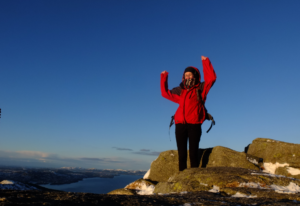My name is Karolína and I come from Czech Republic, Czekkia. For those who are not sure where it is situated, it is “the heart of Europe”, small country with no sea between Poland, Germany, Austria and Slovakia. In Prague, the capital, I study masters in Botany on Charles University and now I have one year left till my final exams. In my master thesis I deal with the fire ecology and dynamics in one heathland area in central Europe, which is topic in Czech Republic surprisingly understudied, particularly because of lack of tradition in fire management and understanding the natural role of fire in ecosystems in general. I am anyway interested in various relationships within plants or between plants and their ecosystems, including organisms from other kingdoms – how complex they can be!
Last semester I studied as exchange student on Bergen Universitetet, where I worked with Vigdis Vandvik and Siri Vatsø Haugum on the Landpress project on norwegian coastal heathlands (and joined the burning!), with bryophytes along gradients specifically. There I learned about the opportunity to join the course on Svalbard, and now it is happening – I look forward to it so much!
I am excited about working in arctic conditions, which are something so much different from my experience so far. I would like to learn more about Svalbard flora and its fascinating adaptations to harsh arctic environment, because I was amazed everytime I saw or red about it, but never had an opportunity to meet it in person. I am happy to be part of the project investigating the impact of climate change in the arctic – because polar regions are proposed to be the most rapidly changing regions of our planet due to the change. I think it is highly important to study them now to understand processes underlying shifts in the communities and other components of their response to the change. Simultaneously, the knowledge from polar regions can be extended to other, more slowly responding parts of our planet, thus stands for the important predictions – and helps to recognize ways how to care about the nature worldwide. I have never worked on the project focusing specifically on plant traits, so I am keen to experience it and acquire knowledge, which may be useful for my own research.
Even though I am interested the most in plants, I am looking forward to see also to me unknown animals of Svalbard! Glad to be part of the group working with gradients under seabird cliff – hope to see many of them. And a whale. And a walrus. And the Svalbard reindeer. With a great respect, I would also love to see the white king, the polar bear! From a big distance, or safety of a house, haha.
As I said above, because the impact of climate change is recognized the most in the arctic, I would expect that a public perception at Svalbard to this topic is open to the idea of changing world and even of the human participation on it, because they may actually see the effects around them, for example the glacier melting or calving… Also, I would expect well public knowledge and accepting the scientific explanations of the climate change, because there is very few inhabitants relatively to research happening in the area. In contrary, although I live a bit in an academic bubble, where the climate change is frequently discussed and accounted with, in my home country I sometimes meet the opinion, that the climate change is not something we are not involved in. Maybe because there is not any dramatic evidence, or maybe because the country is less rich and people are focused more on ensuring themselves and their families. However, when they already think about the climate change, they perceive it often very passionately and blame humans for it a lot.
See you on Svalbard, soon!
